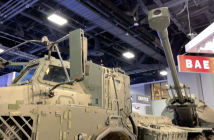A former enlisted Marine was named today as the first-ever “chief learning officer” for the Navy and Marine Corps.
The position was created in February as part Secretary of the Navy Richard Spencer’s Feb. 5 pledge to pull together all the higher learning institutions into what he called a “Naval University.”
Spencer’s pick for the job is John Kroger. He brings a unique resume to the job in a career that has seen him as an administrator, educator and a government lawyer and a Marine reconnaissance scout.
His initial call to service was a familiar story for many teenagers, he told the Harvard Law Bulletin in 2011. He got caught steeling three hubcaps shortly before his high school graduation. His parents kicked him out of the house. With nowhere to go, he joined the Marine Corps. He didn’t look back.
That was 1983. After boot camp, he found his way to the 1st Marine Division’s 1st Reconnaissance Battalion at Camp Pendleton, Calif. He spent the next three years in the unit as a scout during which he developed a love for public service.
“Everything that has happened in my life since that time is directly related to those three years in the Marines,” Kroger told the Bulletin.
Leaving the Corps, he headed east to Yale, where he got both bachelor’s and master’s degrees in philosophy. He netted a law degree from rival Harvard University in 1996,
A long-time educator and lawyer, Kroger leaves his current job as a visiting professor at Harvard Law School and “leader in residence” at Harvard’s Kennedy School of Government to be the civilian head of Spencer’s education efforts at the Pentagon.
Navy officials tell Defense and Aerospace Report that Kroger is expected to be on his new job by the end of the month. He will be a Navy employee and not a political appointee, officials say.
Kroger will work for the Spencer alongside a yet-to-be-named three-star flag officer will become the “N7” with the official moniker of “Director of Warfighting Development.” That officer is expected to be identified no later than Oct. 1, officials say.
The move will eventually involve shifting pieces of the Navy’s N1 organization — Manpower, Personnel, Training and Education — putting them under the new office. But when that will happen and what those parts will be is yet to be decided.
In previous jobs, Kroger was the President of Reed College in Portland, Oregon, from 2012 to 2018. Before that, he was Oregon’s attorney general from 2009 to 2012.
As an assistant U.S. Attorney in the Eastern District of New York from 1997 to 2001, Kroger investigated and prosecuted mobsters and other criminals. After Sept. 11, 2001 he was a part of the Federal Bureau of Investigation’s emergency criminal probe into the attacks.
Under Spencer, Kroger will be responsible, for tying together all the Navy’s higher education institutions including the United States Naval Academy, Naval War College, Marine Corps University and the Naval Postgraduate School.
What Spencer wants, he wrote in February is a loose confederation that has common strategic goals and policies and a universal transcript system that allows each institution to keep “the special characteristics and strengths of each institution.”
“I intend to create a Naval University System that further integrates and aligns naval education, beginning with the establishment of a Naval Community College for our enlisted sailors and Marines,” Spencer wrote. “We will raise individual and organizational learning to the level of a warfare enabler.”
Creating this new “community college” is something Spencer has already set a goal to have up and running by Jan. 1, 2021.
What he wants is regional accreditation for Navy training and experience. This would allow sailors to earn an associate’s degree while on active duty and to transfer those credits to bachelor’s degree programs at civilian universities.
Now, sailors are at the mercy of civilian educational institutions as to what credits they’re allowed towards degree programs from the training and on the job experience they’ve gotten.
Navy officials have already said they’ll take a hard look at how the Air Force has put together their community college. The only one like it in the military, it has been up and running since the 1970’s. It offers degrees related to the military jobs airmen are trained in.
And that’s just what Spencer wants for the Navy. By making the quickest route to a degree for sailors to be internal to the Navy, he gives the service more control on how education dollars are spent by sailors. This past year, the Navy exhausted their tuition assistance budget by the end of May and cut off paying for classes.
Unlike other years, the Navy did not plus up the account with additional dollars, saying the funds were needed elsewhere. Once a fiscal 2020 budget is approved, the service will begin to fund classes again. In the future, programs such as tuition assistance are expected to fall under the new education czar’s office.
“When I talk about education, it’s going to be education that we need as a naval force,” Spencer said in a Jan. 16 speech at the Surface Navy Association’s annual convention in Arlington, Va.
“I really don’t care about someone, to be very frank with you, going off and getting an art history major. I’m being totally selfish, but if these are my dollars, I want you to be learning something that is going to help this institution.”



